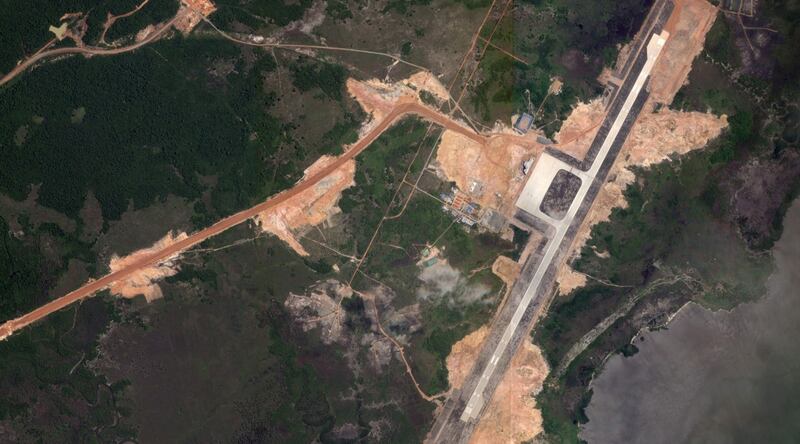U.S. Ambassador to Cambodia W. Patrick Murphy has held a rare meeting with Cambodia’s Minister of Defense General Tea Banh in the wake of sanctions Washington leveled against a Chinese developer operating in the Southeast Asian nation.
The Union Development Group (UDG)—which is building the U.S. $3.8 billion-dollar Dara Sakor project including a seaport, resorts, and casinos in Cambodia’s Koh Kong province —was sanctioned by the Treasury Department on Sept. 15 under the Global Magnitsky Human Rights Accountability Act for land grabs, rights abuses, and corruption in the country.
The Department also raised concerns that Beijing may be using the project to secretly build a naval base and airstrip for military use as part of a bid to secure its territorial claims in the disputed waters of the South China Sea.
Tea Banh, who last week said that UDG had been targeted unfairly and is operating in line with Cambodia’s laws, met with Ambassador Murphy on Monday at the Office of the Council of Ministers in the capital Phnom Penh to hold talks attended by senior officials of both the Defense Ministry and the U.S. Embassy.
In a post to Facebook on Tuesday, the U.S. Embassy said Murphy “had a productive meeting” with Tea Banh, also Cambodia’s deputy prime minister, “to discuss a range of potential areas of strengthened security cooperation, as well as ongoing efforts to preserve Cambodia’s sovereignty.”
U.S. Embassy spokesperson Arend Zwartjes told RFA’s Khmer Service in an email Wednesday that Washington is “hopeful that we can find a way to expand military-to-military cooperation” as a result of the talks.
Cambodia’s Defense Ministry abruptly suspended annual “Angkor Sentinel” joint exercises with the U.S. military in 2017. The government had claimed it was too busy preparing security for commune elections in June 2018 to take part in the exercises, but they have yet to be reestablished.
Observers said at the time that the moves indicated Cambodia was pivoting away from Western influence in favor of better relations with other countries on the rise in Asia, such as China.
In April, Prime Minister Hun Sen said that his government would welcome resumed military drills with the U.S. but urged Washington to stop suggesting that Phnom Penh was responsible for ending the exercises.
The possibility that China could establish a military foothold in Cambodia has long worried Washington. Vice President Mike Pence in 2018 wrote a letter to Hun Sen expressing fears that Cambodia might be planning to host Chinese military equipment at the Ream Naval Base in the coastal city of Sihanoukville, but Hun Sen dismissed the concerns.
Ream base was at the center of controversy last year after The Wall Street Journal in July cited U.S. and allied officials as confirming a secret deal to allow the Chinese to use part of the base for 30 years—with automatic renewals every 10 years after that—and to post military personnel, store weapons and berth warships.
The reported deal, which would provide China with its first naval staging facility in Southeast Asia and allow it to significantly expand patrols on the South China Sea, was vehemently denied at the time by Hun Sen, who said permitting foreign use of a military base in the country would “be in full contradiction to Cambodia’s constitution.”

Reports dismissed
Cambodia’s Ministry of Defense posted a statement on its website Tuesday saying Tea Banh reiterated that reports Cambodia will allow a Chinese military presence on its territory are unfounded.
“Samdech Tea Banh said that Ream Navy Base is small and shallow and cannot accommodate big ships or big vessels,” the statement said, referring to the minister with an honorific title and adding that any development of the site will be “for Cambodian naval use only.”
However, Tea Banh noted that development at Ream Navy Base had been studied over the last 10 years and upon completion would “welcome any ship.”
“Tea Banh stressed that Cambodia’s constitution won’t allow any foreign military base on Cambodian territory,” the statement said.
“Related to the U.S. concerns over Ream Navy Base, Tea Banh stressed that it will be solely reserved for Cambodian usage, not for foreign militaries.”
Speaking to RFA, political analyst Em Sovannara said Washington routinely brings up the possibility of a foreign navy base to counter Chinese influence in Cambodia and to ensure Hun Sen’s government honors the country’s constitution.
He said Cambodia should “show the world it is impartial and welcome all stakeholders.”
“Cambodia should show it is not leaning toward any particular powerful nation and should open cooperation to all countries in a gesture of goodwill,” he said.
Reported by RFA’s Khmer Service. Translated by Samean Yun. Written in English by Joshua Lipes.
